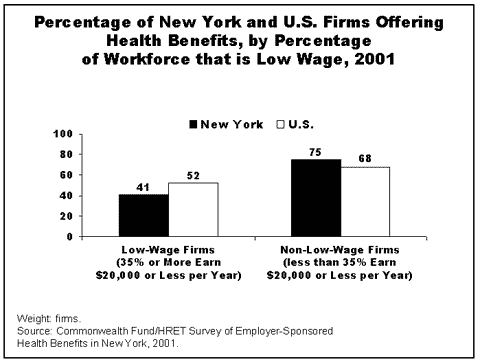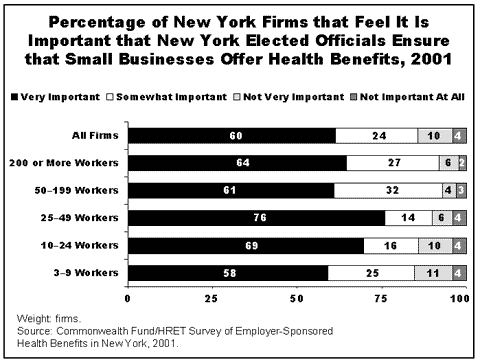New York City, August 27, 2002—A new survey of New York employers and health benefits reveals that workers in the state's low-wage firms are less likely to be offered health insurance than workers in low-wage firms nationwide, according to a report from The Commonwealth Fund. Workers in New York's low-wage and small firms are less likely to be offered health benefits, and are more likely to face long waiting times, higher premium costs, and less generous benefit packages than their counterparts in non-low-wage and larger businesses in the state. The report also finds that the majority of New York's larger firms expect to pass more health benefit costs on to employees in the future.
"Employer health coverage is under stress in New York and across the nation, particularly for smaller firms and businesses employing workers at the low end of the wage scale," said Karen Davis, president of The Commonwealth Fund. "We need to develop solutions that build on employer coverage and public programs to help low-wage workers and their families afford health insurance." The report, Employer Health Coverage in the Empire State: An Uncertain Future, was co-authored by researchers at Health Research and Educational Trust (HRET), who conducted the survey, and Commonwealth Fund staff.
New York Lags in Coverage for Workers in Low-Wage Firms
Although offer rates of employee health care coverage in New York are similar to the nation on average, the state falls behind in coverage of workers in low-wage firms, defined as firms with 35% or more of workers earning $20,000 or less per year. Only two of five (41%) low-wage firms in New York state offer health insurance to their employees, compared with the national average of 52% for low-wage firms.
About two-thirds (68%) of New York small firms offer health benefits, compared to nearly all medium (93%) and large firms (99%). Small firms are defined as having 3-49 workers, medium firms 50-199 workers, and large firms 200+ workers.
 Many Workers Have High Premium Costs and Limited Benefits
Many Workers Have High Premium Costs and Limited Benefits
Monthly premiums are high in New York City, averaging $734 for family coverage and $277 for single coverage, compared with $540 for family and $223 for single coverage upstate, and average U.S. premiums of $588 family and $221 single coverage.
"In New York City, the cost of family coverage is 25 percent greater than the national average. Upstate, insurance costs nine percent less than the national average," said Jon Gabel, vice president for health system studies at HRET and coauthor of the report. "Even before September 11th there were serious indications that the employer-sponsored system was about to slip into a state of decline."
New York workers in small firms and low-wage firms pay more in monthly premiums for family coverage in terms of dollars and as a percentage of total monthly costs than employees in larger firms. But despite paying more, workers in small firms tend to get less value for their premium. Deductibles are higher and benefits less broad. For example, health benefits in small firms are less likely to cover prenatal care than large firms (92% vs. 99%).
Waiting Periods More Common in Low-Wage or Small Firms
Even when workers in New York's low-wage or small firms have coverage they are often likely to experience restrictions such as long waiting periods before their coverage begins. Over half (54%) of workers in low-wage firms must wait three or more months compared with one-fourth (26%) of workers in non-low-wage firms. Nearly half of workers (47%) in small firms must wait three or more months for coverage, compared with one of five (21%) workers in large firms.
 Employers Express Concerns About Costs
Employers Express Concerns About Costs
Health insurance costs are a concern for employers and the majority of larger firms in the survey indicated they will pass more costs on to workers in the future. Three-quarters (73%) of larger employers and 58% of medium-sized employers said they are likely to shift more costs to workers. If employers act as planned, three of four New York employees with job-based health benefits will see their insurance costs increase. The leading reason employers give for not offering health benefits is that premiums are too high (64% very important), followed by a belief that their employees are covered elsewhere (42% very important).
Employers express strong interest in solutions involving public programs. Three-quarters of employers are interested in subsidizing workers' participation in state-subsidized health insurance programs (77%) or the state employee health plan (78%). New York employers of all sizes feel it is important for policymakers to help small businesses provide health insurance benefits.
 "Employers were more willing to endure the high cost of coverage at the tail end of a tight labor market. Large premium increases, sluggish economic growth, and the enduring effects of the World Trade Center attack likely explain firms' prediction that they would soon reduce coverage or make their workers pay more for it," said David Sandman, assistant vice president at the Fund and co-author of the report. "Under these conditions, erosion in the availability and generosity of health benefits is likely to occur."
"Employers were more willing to endure the high cost of coverage at the tail end of a tight labor market. Large premium increases, sluggish economic growth, and the enduring effects of the World Trade Center attack likely explain firms' prediction that they would soon reduce coverage or make their workers pay more for it," said David Sandman, assistant vice president at the Fund and co-author of the report. "Under these conditions, erosion in the availability and generosity of health benefits is likely to occur."


